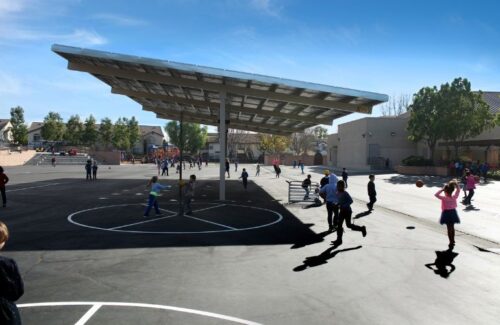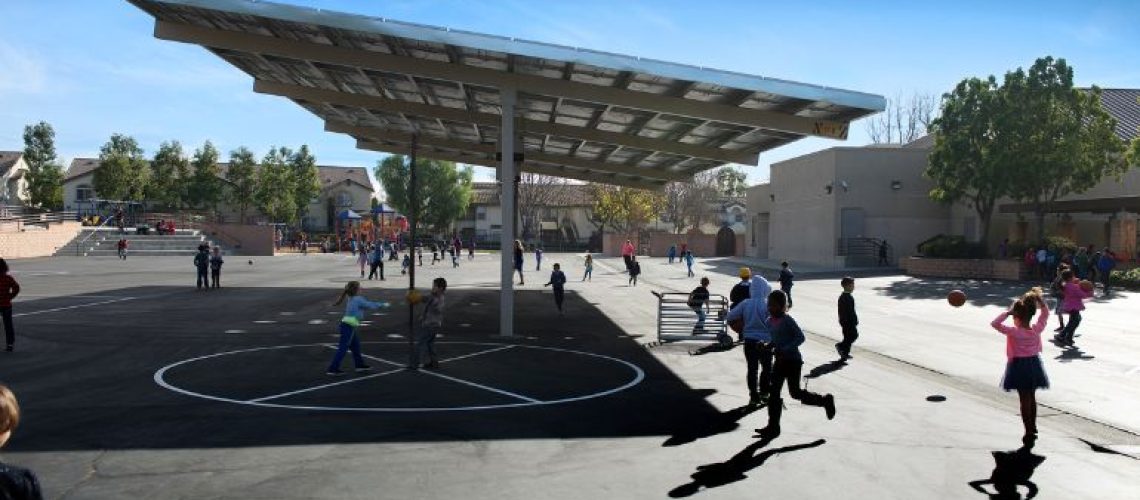
Luminace’s installation at Tulita Elementary in Redondo Beach.
Schools across the country are rapidly switching to solar power to meet their energy needs while gaining significant cost-savings, STEM learning and climate resiliency benefits, according to a new report from clean energy nonprofit Generation180. Since the start of 2015, the amount of solar installed by U.S. K-12 schools has tripled.
According to “Brighter Future: A Study of Solar on K-12 Schools,” 4th edition, over six million students now attend more than 8,400 schools nationwide that utilize solar power. The growth of solar energy on schools has reached 1 in 10 (9%) of all K-12 public and private schools in the United States. The report also found that nearly half (47%) of the public schools with solar are eligible for the Title 1 Schoolwide Program, which serves a large population of low-income students.
Schools with budgets of all sizes are going solar through third-party partnerships that remove the barrier of upfront costs and help schools see immediate energy cost savings. The report found that 87% of solar power installed at U.S. schools was funded through these third-party arrangements and the remainder was purchased and owned directly by schools.
“The benefits of solar energy are now reaching a broad range of schools across the country, including schools in under-resourced communities that stand to gain the most from the energy cost savings and educational opportunities that solar technology provides. We are striving for all schools and communities, regardless of their size, geography or wealth, to have access to clean and affordable power,” said Tish Tablan, lead report author and director of Generation180’s Solar For All Schools Program.
The report comes at a time of unparalleled momentum and historic federal investment in clean energy, most recently with the Inflation Reduction Act, which includes $369 billion toward renewable projects that will create a surge in demand for skilled clean energy workers.
“We need the education sector to help advance our country’s transition to a clean energy economy. K-12 schools are becoming incubators for our future clean energy workforce by teaching about renewable energy, engaging in hands-on STEM research, and training students for solar careers. Schools need to be preparing our children to help build a better future,” said Wendy Philleo, executive director of Generation180.
Workforce training and emergency response benefits

Luminace’s installation at Coyote Canyon Elementary School in Rancho Cucamonga.
The report shares success stories of K-12 schools that are capitalizing on solar projects to give students hands-on STEM learning opportunities and job training for solar careers. For example, in Denver Public Schools’ Renewable Energy Academy, high school students begin preparing for employment as solar installers. The job is expected to become one of the country’s fastest-growing occupations over the next decade.
Schools are also combining solar with battery storage to manage their energy consumption from the grid and provide back-up power to their buildings. In Albuquerque, New Mexico, the solar and storage under installation at Atrisco Heritage Academy High School will soon enable the school to reduce electricity bills by bringing down peak energy demand. The district plans to make it a resilient campus that can stay open for both students and community members during power outages and climate emergencies.
The Brighter Future report also found that:
- The top five states for solar capacity at schools — California, New Jersey, Arizona, Massachusetts and Illinois — helped drive national growth of solar on schools.
- At 1,647 MW of installed solar capacity, our nation’s schools now generate enough solar energy to power 300,000 homes’ electricity use each year. That is enough energy to power all the households in cities the size of Washington, D.C., Boston, or Denver.
- The report provides a comprehensive overview of solar adoption by U.S. K-12 schools, including national trends, state rankings and success stories of schools reaping the benefits of going solar.
News item from Generation180



